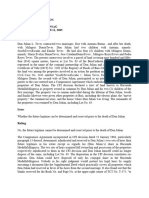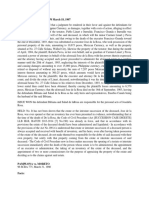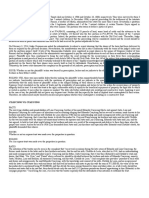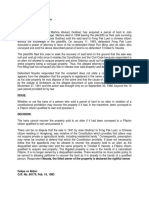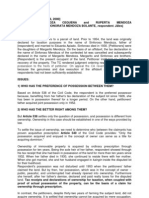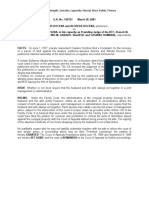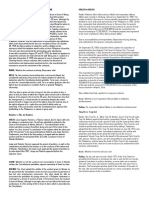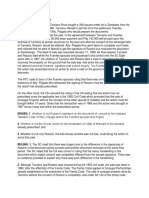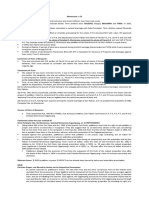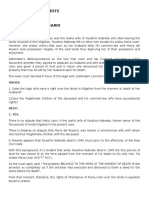Genato vs. de Lorenzo-Donation in A Public Document: Facts
Genato vs. de Lorenzo-Donation in A Public Document: Facts
Uploaded by
Charlotte GallegoCopyright:
Available Formats
Genato vs. de Lorenzo-Donation in A Public Document: Facts
Genato vs. de Lorenzo-Donation in A Public Document: Facts
Uploaded by
Charlotte GallegoOriginal Description:
Original Title
Copyright
Available Formats
Share this document
Did you find this document useful?
Is this content inappropriate?
Copyright:
Available Formats
Genato vs. de Lorenzo-Donation in A Public Document: Facts
Genato vs. de Lorenzo-Donation in A Public Document: Facts
Uploaded by
Charlotte GallegoCopyright:
Available Formats
GENATO VS.
DE LORENZODONATION IN A PUBLIC DOCUMENT
The delivery by the donor and the acceptance by done must be simultaneous and the acceptance by a person other than the true done must be authorized by a proper power of attorney set forth in a public document
FACTS:
The property under dispute in this case is the 530 shares of stocks of Genato Commercal Corporation, which has P100 par value, of the deceased Simona B. De Genato (Director and secretary-treasurer of the said company). The petitioners herein, 2 heirs of Simona, are claiming that they own 530 shares of stocks of Genato Commercal Corporation because of the donation made by Simona to them. Respondents (other remaining heirs), however, are trying to recover from the petitioners, their coheirs, the said stocks so they can include it in the intestate estate which should later be distributed among all the surviving children of the decedent.
Four or five days after having Florentino Genato elected and designated as Assitant SecretaryTreasurer of the Corporation, 265 shares were issued in favour of Florentino Genato and another 265 were issued in favour of Francisco G. Genato. These were not presented as evidence in the course of the trial; they were merely mentioned by Florentino Genato in the course of his testimony as a witness.
ISSUE: Whether or not there was a valid donation? RULING:
NO. There was no valid donation for lack of proper acceptance. Incontestably, one of the two donees was not present at the delivery, and there is no showing that Francisco Genato had authorized his brother, Florentino to accept for both of them. The delivery by the donor and the acceptance by done must be simultaneous and the acceptance by a person other than the true done
must be authorized by a proper power of attorney set forth in a public document. None has been claimed to exist in this case.
Eugenio Cagaoan vs. Felix Cagaoan 43 PHIL 554
FACTS: On November 3, 1915, Gregorio Cagaoan executed a deed of gift of four parcels of land situated in the municipality of Tayug, Province of Pangasinan, in favor of his son Felix Cagaoan and on October 26, 1918, he executed a similar deed in favor of his other son Eugenio Cagaoan for a parcel of land which, apparently, is the same as that described as parcel No. 4 in the deed of gift executed in favor of Felix. Both of the deeds of gift are free from formal defects and were duly accepted by the donees. Eugenio was able to take possession of the donation he received, but he was not able to register the same. On the other hand, Felix was able to register his part. HELD:
Felix has a better right over the property donated. This follows the rules on double sales
The case seems to use to be analogous to one where the same real property has been sold by the same vendor to two difference vendees. In such cases, under article 1473 of the Civil Code, the property goes to the vendee who first records his title in the registry of property. If the sale is not recorded by either vendee, the property goes to the one who first takes possession of its in good, faith, and in the absence of both record and possession, to the one who present oldest title, provided there is good faith. (It follows the rule of double sales.)
CENON FERNANDEZ vs. CESAR MERCADER and ISABEL NOEL FACTS: Fernandez and Juan Melgar entered into a partnership involving parcels of lands and carabaos, to be administered by Mr. Fernandez. Dur ing Melgars lifetime, he executed a deed of gift of parcel of land together with the work animals therein, in favor of Cesar Mercader and his wife Isabel Noel. Before Melgar died, Mercader had a conversation with Fernandez and as a result of the conversation agreed in writing to continue the partnership between Fernandez and Melgar under the new name of Mercader-Fernandez. When Fernandez filed an action for the partition of the parcels of land, alleging that the property he seeks to have partitioned is owned by him in common with the defendants, the latter denied the allegations of Fernandez complaint, asserting that they have acquired title in fee simple to the entire property through a donation made by Juan Melgar and his wife. ISSUE: Whether or not Fernandez has a right to one-half of the property in question RULING: The Court ordered that said parcel be partitioned as prayed for in the complaint, onehalf thereof to be assigned to Cenon Fernandez and the other half to be assigned to the spouses Mercader and Noel jointly. It was further ordered that the registration in the names defendants should be cancelled. Melgar was the owner of only an undivided one-half of the land and that was all he could legally convey to the donees. Mercader had full notice of the claim of Fernandez to the property in question before the donation was recorded as he is the grandson of Melgar, was
in intimate relations with him, and the interest of Fernandez in the Basak property appear to have been quite generally known. Mercader and his wife are not deemed third persons within the meaning of article 34 of the Mortgage Law, and their position was not improved by the recording of their title in the registry of deeds.
Peshing Tan Queto v. Court of Appeals
Facts: Restituta Tagalinar Guangco de Pombuena received the questioned lot (Lot 304-B of the Cadastre Survey of the Municipality of Centro, Misamis Occidental) either as a purported donation or by way of purchase on 11 February 1927 for P50.00 as the alleged consideration thereof. The transaction took place during her mother's lifetime (her father having predeceased the mother) and consummated while Restituta was already married to her husband Juan Pombuena. On 22 January 1935, Juan filed an application of Torrens title over the land for himself and his supposed co-owner Restituta. On 22 November 1938, a decision was promulgated (GLRC 1638, Cadastral Case 12) pronouncing Juan (married to Restituto) as the owner of the land. On 22 September 1949 a contract of lease over the lot was entered into between Pershing Tan Queto and Restituta (with the consent of her husband) for a period of 10 years. Meanwhile, On 27 December 1960 Restituta sued Tan Queto for unlawful detainer (the lease contract having expired) before the Municipal Court of Ozamis City. On 22 April 1962, as a consequence of the cadastral case, an OCT was issued in Juans name. On 10 October 1962, Tan Queto and Juan entered into a barter agreement whereby Tan Queto became the owner of the disputed lot, and the spouses in turn became the owners of a parcel of land with the house constructed thereon previously owned (that is, before the barter) by Tan Queto. Thereafter, Tan Queto constructed on the disputed land a concrete building, without any objection on the part of Restituta. The Municipal court ruled in favor of the spouses in the unlawful detainer case; but on appeal in the CFI, the entire case was dismissed because of an understanding (barter) entered into by Juan and Tan Queto. Restituta sued both Juan and Tan Queto for reconveyance of the title over the registered but disputed lot, for annulment of the barter, and for recovery of the land with damages. The CFI and the Court of Appeals found the disputed lot as paraphernal and that Tan Queto was a builder in bad faith. These findings were regarded by the Supreme Court as findings of facts and thus ordinarily conclusive upon the Court. Tan Queto filed for a motion for reconsideration of the Supreme Court decision dated 16 May 1983.
Issue: Whether or not Tan Queto was in bad faith
Held: Yes, Assuming Tan Queto recognized Restituta as the owner; bad faith of one neutralizes the bad faith of the other. Even assuming that despite registration of the lot as conjugal, Tan Queto nursed the belief that the lot was actually Restituta's (making him in bad faith), still Restitutas failure to prohibit him from building despite her knowledge that construction was actually being done, makes her also in bad faith. The net resultant of mutual bad faith would entitle Tan Queto to the rights of a builder in good faith (Art. 448, Civil Code), ergo, reimbursement should be given him if Restituta decides to appropriate the building for herself (Art. 448, Civil Code).
Tan Queto having bartered his own lot and small house with the questioned lot with Juan (who has been adverted to by a court decision and by the OCT a conjugal owner) may be said to be the owner-possessor of the lot. Certainly he is not merely a possessor or builder in good faith (this phrase presupposes ownership in another); much less is he a builder in bad faith. He is a builder-possessor (jus possidendi) because he is the owner himself. The Chapter on Possession (jus possessionis, not jus possidendi) in the Civil Code refers to a possessor other than the owner. The difference between a builder (or possessor) in good faith and one in bad faith is that the former is not aware of the defect or flaw in his title or mode of acquisition while the latter is aware of such defect or flaw (Art. 526, Civil Code). But in either case there is a flaw or defect. In the present case, there is no such flaw or defect because it is Tan Queto himself (not somebody else) who is the owner of the property.
You might also like
- Full Download Sustainable Fashion and Textiles 2nd Edition Kate Fletcher PDF DOCXNo ratings yetFull Download Sustainable Fashion and Textiles 2nd Edition Kate Fletcher PDF DOCX67 pages
- Handled by Atty. Elman Is Not Intended To Replace Your Books and Major References. God BlessNo ratings yetHandled by Atty. Elman Is Not Intended To Replace Your Books and Major References. God Bless10 pages
- PNP Arrest and Booking Sheet: (To Be Accomplished by The Arresting Officer)No ratings yetPNP Arrest and Booking Sheet: (To Be Accomplished by The Arresting Officer)1 page
- Eugenio Domingo, Crispin Mangabat and Samuel Capalungan vs. Hon. Court of Appeals, Felipe C. Rigonan and Concepcion R. RigonanNo ratings yetEugenio Domingo, Crispin Mangabat and Samuel Capalungan vs. Hon. Court of Appeals, Felipe C. Rigonan and Concepcion R. Rigonan10 pages
- Cenon Fernandez vs. Cesar Mercader and Isabel NoelNo ratings yetCenon Fernandez vs. Cesar Mercader and Isabel Noel3 pages
- Almirol v. Register of Deeds of Agusan G.R. No. L-22486 March 20, 1968100% (1)Almirol v. Register of Deeds of Agusan G.R. No. L-22486 March 20, 196833 pages
- Supreme Court: Fernandez Law Offices For Petitioner. Francisco Pulido For RespondentsNo ratings yetSupreme Court: Fernandez Law Offices For Petitioner. Francisco Pulido For Respondents51 pages
- Facts:: Third Person Who Contracted With The Agent Himself Acted in Good Faith. Good Faith Here Means That TheNo ratings yetFacts:: Third Person Who Contracted With The Agent Himself Acted in Good Faith. Good Faith Here Means That The5 pages
- Capitol Wireless Inc V Provincial Treasurer of BatangasNo ratings yetCapitol Wireless Inc V Provincial Treasurer of Batangas11 pages
- Case No. 1 Zapanta vs. Posadas G.R. Nos. L-29204-09, December 29, 1928 FactsNo ratings yetCase No. 1 Zapanta vs. Posadas G.R. Nos. L-29204-09, December 29, 1928 Facts29 pages
- Philippine Banking Corporation vs. Lui SheNo ratings yetPhilippine Banking Corporation vs. Lui She9 pages
- Property Cases Art. 494 495sylabus - WordNo ratings yetProperty Cases Art. 494 495sylabus - Word44 pages
- To The Material Facts of The Case Provided As FollowsNo ratings yetTo The Material Facts of The Case Provided As Follows2 pages
- Ross, Lawrence and Selph For Appellant. Camus and Delgado For AppelleeNo ratings yetRoss, Lawrence and Selph For Appellant. Camus and Delgado For Appellee98 pages
- The Redskins; or, Indian and Injin, Volume 1. Being the Conclusion of the Littlepage ManuscriptsFrom EverandThe Redskins; or, Indian and Injin, Volume 1. Being the Conclusion of the Littlepage ManuscriptsNo ratings yet
- Report of the Decision of the Supreme Court of the United States, and the Opinions of the Judges Thereof, in the Case of Dred Scott versus John F.A. Sandford December Term, 1856.From EverandReport of the Decision of the Supreme Court of the United States, and the Opinions of the Judges Thereof, in the Case of Dred Scott versus John F.A. Sandford December Term, 1856.No ratings yet
- Program Outcomes Performance Indicator: (Refer To PSG of The Program)No ratings yetProgram Outcomes Performance Indicator: (Refer To PSG of The Program)4 pages
- Calendar of Activities 2017-2018 - Institutional CalendarNo ratings yetCalendar of Activities 2017-2018 - Institutional Calendar8 pages
- Tribunal Holds Hearing On Jurisdictional Questions in Philippines V China Arbitration - Lea ChristopherNo ratings yetTribunal Holds Hearing On Jurisdictional Questions in Philippines V China Arbitration - Lea Christopher7 pages
- On Patriarchy (Feminist Review, Issue 3) (1979)No ratings yetOn Patriarchy (Feminist Review, Issue 3) (1979)18 pages
- Sars-Cov 2 Rapid Antigen Test: Municipal Health OfficeNo ratings yetSars-Cov 2 Rapid Antigen Test: Municipal Health Office4 pages
- Children's Advocacy Centers of Texas Annual Report (2015)No ratings yetChildren's Advocacy Centers of Texas Annual Report (2015)2 pages
- Corporate Communications A Practice-Based TheoretiNo ratings yetCorporate Communications A Practice-Based Theoreti21 pages
- Activity 1 - Fundamentals To Auditing and Assurance Services100% (1)Activity 1 - Fundamentals To Auditing and Assurance Services14 pages
- Vocabulary Anh Văn Hp3 Vocabulary Anh Văn Hp3No ratings yetVocabulary Anh Văn Hp3 Vocabulary Anh Văn Hp313 pages
- Bentham Deleuze and Beyond An Overview of SurveillNo ratings yetBentham Deleuze and Beyond An Overview of Surveill30 pages
- Is Cultural Psychology A Once and Future PDFNo ratings yetIs Cultural Psychology A Once and Future PDF14 pages
- Lambino vs. COMELEC, G.R. No. 174153, October 25, 2006No ratings yetLambino vs. COMELEC, G.R. No. 174153, October 25, 20065 pages
- Full Download Sustainable Fashion and Textiles 2nd Edition Kate Fletcher PDF DOCXFull Download Sustainable Fashion and Textiles 2nd Edition Kate Fletcher PDF DOCX
- Handled by Atty. Elman Is Not Intended To Replace Your Books and Major References. God BlessHandled by Atty. Elman Is Not Intended To Replace Your Books and Major References. God Bless
- PNP Arrest and Booking Sheet: (To Be Accomplished by The Arresting Officer)PNP Arrest and Booking Sheet: (To Be Accomplished by The Arresting Officer)
- Eugenio Domingo, Crispin Mangabat and Samuel Capalungan vs. Hon. Court of Appeals, Felipe C. Rigonan and Concepcion R. RigonanEugenio Domingo, Crispin Mangabat and Samuel Capalungan vs. Hon. Court of Appeals, Felipe C. Rigonan and Concepcion R. Rigonan
- Cenon Fernandez vs. Cesar Mercader and Isabel NoelCenon Fernandez vs. Cesar Mercader and Isabel Noel
- Almirol v. Register of Deeds of Agusan G.R. No. L-22486 March 20, 1968Almirol v. Register of Deeds of Agusan G.R. No. L-22486 March 20, 1968
- Supreme Court: Fernandez Law Offices For Petitioner. Francisco Pulido For RespondentsSupreme Court: Fernandez Law Offices For Petitioner. Francisco Pulido For Respondents
- Facts:: Third Person Who Contracted With The Agent Himself Acted in Good Faith. Good Faith Here Means That TheFacts:: Third Person Who Contracted With The Agent Himself Acted in Good Faith. Good Faith Here Means That The
- Capitol Wireless Inc V Provincial Treasurer of BatangasCapitol Wireless Inc V Provincial Treasurer of Batangas
- Case No. 1 Zapanta vs. Posadas G.R. Nos. L-29204-09, December 29, 1928 FactsCase No. 1 Zapanta vs. Posadas G.R. Nos. L-29204-09, December 29, 1928 Facts
- To The Material Facts of The Case Provided As FollowsTo The Material Facts of The Case Provided As Follows
- Ross, Lawrence and Selph For Appellant. Camus and Delgado For AppelleeRoss, Lawrence and Selph For Appellant. Camus and Delgado For Appellee
- The Redskins; or, Indian and Injin, Volume 1. Being the Conclusion of the Littlepage ManuscriptsFrom EverandThe Redskins; or, Indian and Injin, Volume 1. Being the Conclusion of the Littlepage Manuscripts
- Report of the Decision of the Supreme Court of the United States, and the Opinions of the Judges Thereof, in the Case of Dred Scott versus John F.A. Sandford December Term, 1856.From EverandReport of the Decision of the Supreme Court of the United States, and the Opinions of the Judges Thereof, in the Case of Dred Scott versus John F.A. Sandford December Term, 1856.
- Program Outcomes Performance Indicator: (Refer To PSG of The Program)Program Outcomes Performance Indicator: (Refer To PSG of The Program)
- Calendar of Activities 2017-2018 - Institutional CalendarCalendar of Activities 2017-2018 - Institutional Calendar
- Tribunal Holds Hearing On Jurisdictional Questions in Philippines V China Arbitration - Lea ChristopherTribunal Holds Hearing On Jurisdictional Questions in Philippines V China Arbitration - Lea Christopher
- Sars-Cov 2 Rapid Antigen Test: Municipal Health OfficeSars-Cov 2 Rapid Antigen Test: Municipal Health Office
- Children's Advocacy Centers of Texas Annual Report (2015)Children's Advocacy Centers of Texas Annual Report (2015)
- Corporate Communications A Practice-Based TheoretiCorporate Communications A Practice-Based Theoreti
- Activity 1 - Fundamentals To Auditing and Assurance ServicesActivity 1 - Fundamentals To Auditing and Assurance Services
- Bentham Deleuze and Beyond An Overview of SurveillBentham Deleuze and Beyond An Overview of Surveill
- Lambino vs. COMELEC, G.R. No. 174153, October 25, 2006Lambino vs. COMELEC, G.R. No. 174153, October 25, 2006









